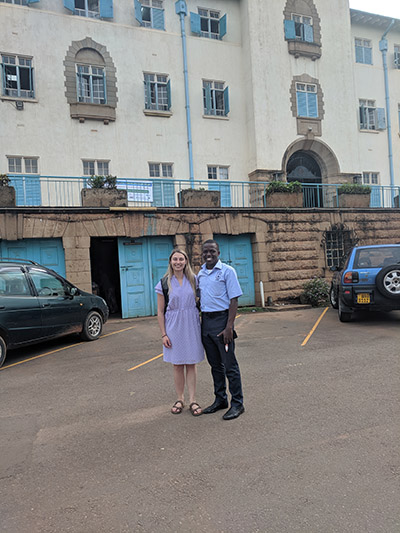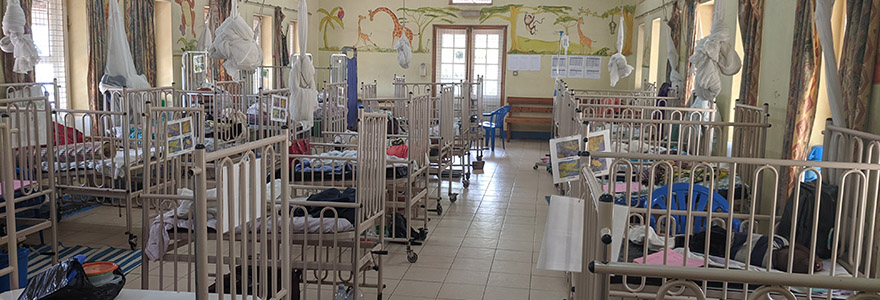Medical student practises humanity during pre-clinical elective in Uganda
By Max Martin, MA’19
During a pre-clinical elective in Uganda, Amanda Stojcevski discovered that giving back can enhance learning.
At the end of her second year in June, the Windsor Campus medical student travelled nearly 12,000 kilometres from Ontario to Kampala, Uganda, to learn at Mulago Hospital, the largest public hospital in the country.
While there, Stojcevski, took over the ‘Practice Humanity, Be the Remedy’ project, a charitable initiative started the year prior by then Global Health Management master’s student Tahani Dakkak.
The initiative is a grassroots effort to help patients in Kampala who can’t afford essential diagnostic and imaging tests, or some forms of medication or treatment.
“The purpose is to pinpoint patients who truly are not able to afford the care they need to get better. Sometimes these patients have been in the hospital for a long time, becoming more ill, because they cannot access the treatment, lab tests and imaging needed to diagnose them properly,” Stojcevski said. “Uganda is a low-income country, and despite Mulago Hospital being a public hospital, a lot of medication, imaging or lab work isn’t necessarily covered, so some people just have to go without.” Before departing for her elective, Stojcevski fundraised in Canada, so she had a pool of funds to draw from when she met a patient in need.
Before departing for her elective, Stojcevski fundraised in Canada, so she had a pool of funds to draw from when she met a patient in need.
“It costs us relatively little to contribute to the care of these people, and often a little bit can go a long way,” Stojcevski said, adding something like a chest X-ray could cost as little as $4 in Canadian currency, but still might be too much for a patient or their family in Kampala to be able to pay.
In Kampala, Stojcevski collaborated with other medical students, interns, staff, physicians and social workers to help identify which patients might need assistance.
She would then meet with the patient, review their chart, and get a sense of what treatment or test they required. If they couldn’t afford the medication or diagnostic test any other way, Stojcevski would then go with the patient directly to receive what they needed using funds from her donations.
“It not only allowed me to contribute to care and give back to the community in Kampala, but it also enhanced my learning in that I was more invested in these patients and their medical conditions,” Stojcevski explained. “It gave me a reason to read up on them more, think about why they are being treated a certain way or why a certain test was ordered, and to assess if they will get better with treatment.”
Throughout her time at Mulago Hospital, she shared patient stories and receipts with donors back home, so they knew exactly how their contributions were being used.
“Doing a bit of charity work, I felt like I wasn’t only there to observe and learn from their illness, which is all I was able to do from a medical perspective given my level of training. I was also there to do something meaningful and contribute to their care in another way,” Stojcevski said.
Medical students in first or second year can take advantage of International Health Equity Learning experiences through the School’s Internationalization Office. The pre-clinical electives abroad are designed to give learners an understanding of global health care early on in their training.
For Stojcevski, the experience in Uganda was invaluable. She says she learned a lot about working in low-resource health care settings and discovered a newfound admiration for the creativity and clinical judgement of the physicians in Uganda.
“It was good to see how they were really thinking things through,” she said.
One of the most memorable things Stojcevski saw in the hospital were makeshift CPAP machines. A CPAP machine is used to open up a patient’s airways, but at Mulago Hospital, the equipment isn’t always available. Stojcevski says doctors would create a similar device using a water bottle and oxygen tube. Seeing practitioners tear the cuff off of latex gloves to use as tourniquets for IV insertion or collecting blood samples was also common.
“It just spoke to how creative they have to be,” she said. “If they didn’t have something, they’d find a way around it.”
But the journey abroad also gave Stojcevski an appreciation for the health care systems available back in her home country.
“I realized how fortunate we are here and how easily we have access to imaging, equipment and resources.”
She hopes to collaborate with students travelling to Mulago Hospital next year for their pre-clinical electives, so they too can continue the ‘Practice Humanity, Be the Remedy’ project.
“They’re travelling all this way to learn anyway, and if they fundraised even just a little bit, it could end up making a big difference for some patients in need.”
As she continues her medical studies, Stojcevski says her involvement in the charity project, and integrated learning in Kampala, have inspired her to pursue humanitarian efforts further.
“I was pretty nervous about going at first, but I think now I’d feel more comfortable going anywhere abroad,” she said. “I now know I can adapt to and learn about different health care systems and figure out how to navigate them. The whole experience definitely motivated me to do more international medical work in the future.”









